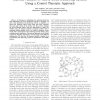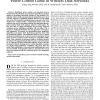276 search results - page 13 / 56 » A control theoretic approach to noncooperative game design |
ASPDAC
2005
ACM
13 years 9 months ago
2005
ACM
— In this paper, a methodology for analyzing closed loop clock distribution and active deskewing networks is proposed. An active clock distribution and deskewing network is model...
CN
2007
13 years 7 months ago
2007
In this paper we analyze a novel paradigm of reliable communication which is not based on the traditional timeout-andretransmit mechanism of TCP. Our approach, which we call Fount...
WIOPT
2010
IEEE
13 years 5 months ago
2010
IEEE
—Cognitive radio networks provide the capability to share the wireless channel with licensed (primary) users in an opportunistic manner. Primary users have a license to operate i...
TON
2008
13 years 7 months ago
2008
Distributed power control is an important issue in wireless networks. Recently, noncooperative game theory has been applied to investigate interesting solutions to this problem. Th...
WICON
2008
13 years 9 months ago
2008
Much previous work has examined the wireless power control problem using tools from game theory, an economic concept which describes the behavior of interdependent but non-coopera...


